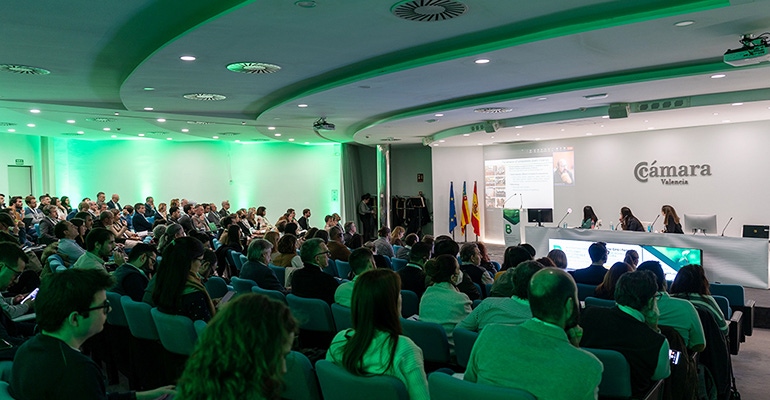Global AIMPLAS Seminar Highlights Biopolymers
Innovations for agriculture and packaging that use bioplastics or sustainable bio-composites were featured.
March 9, 2023

This year’s International Seminar on Biopolymers and Sustainable Composites, held by AIMPLAS, the Plastics Technology Centre, drew some 200 attendees. At the eighth edition of the seminar, held in Valencia, Spain, on March 1-2, 2023, speakers discussed the challenges and opportunities facing the bioplastics industry.
Session topics included Bioplastics and Bioeconomy, Standardization and Certification, Raw Materials, Biopolymers in Open Environments, and Success Stories.
In the Bioplastics and Bioeconomy session, Constance Ißbrücker, deputy managing director and head of environmental affairs at European Bioplastics, estimated that global bioplastic production will grow to 6.3 million tonnes/6.2 million tons by 2027, nearly triple 2022’s production of 2.2 million tonnes/2.16 million tons.
Applications poised for the greatest growth relate to agriculture, which currently accounts for 4% of total bioplastic production and is expected to increase to 5% by 2027.
Theodora Nikolakopoulou, a policy officer for fertilizing products with the European Commission (EC), addressed Europe’s goal of protecting farmland and its mandate to make all controlled-action fertilizers marketed in the European Union (EU) biodegradable, starting in July 2026. AIMPLAS is advising the EC about the criteria these products will need to meet to assure biodegradable status.
Compostable bioplastics were highlighted in select applications where they contribute value.
Jordi Simón, technical director of Asobiocom, the Spanish Association of Biodegradable and Compostable Plastics, described applications for compostable plastics. Simón emphasized the importance of using compostable materials only in applications where bioplastics contribute value, maintain product functionality, and boost end-of-life sustainability gains.
Another session at the seminar underscored the importance of standardizations and certifications when communicating the advantages of bioplastics to ensure appropriate use and end-of-life management and to reap desired environmental benefits.
Companies from all parts of the bioplastics value chain discussed their innovations at the seminar. Topics included additives that improve biopolymer processability and compatibility, and water bottles made from recycled polylactic acid (PLA) that display the same properties as bottles made from virgin PLA.
Attendees learned about pyrotechnic devices for air shows that are made from blown-film extruded bioplastic. They also saw a range of compostable containers and closures that demonstrate the same characteristics as traditional plastics and can be processed using conventional equipment.
For the packaging sector, AIMPLAS presented results of projects that included biodegradable barrier packaging made from food waste, plastic film derived from coffee waste, active packaging that extends the shelf life of cheese and is made from cheese-industry waste, and cartridges for 3D food printing.
Success stories at the seminar included the biodegradability of proprietary bioplastic material; biopolymer solutions for sustainable agriculture; and a method for measuring biodegradation in compost, fresh and waste waters, soil, and marine environments.
You May Also Like


